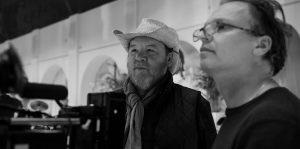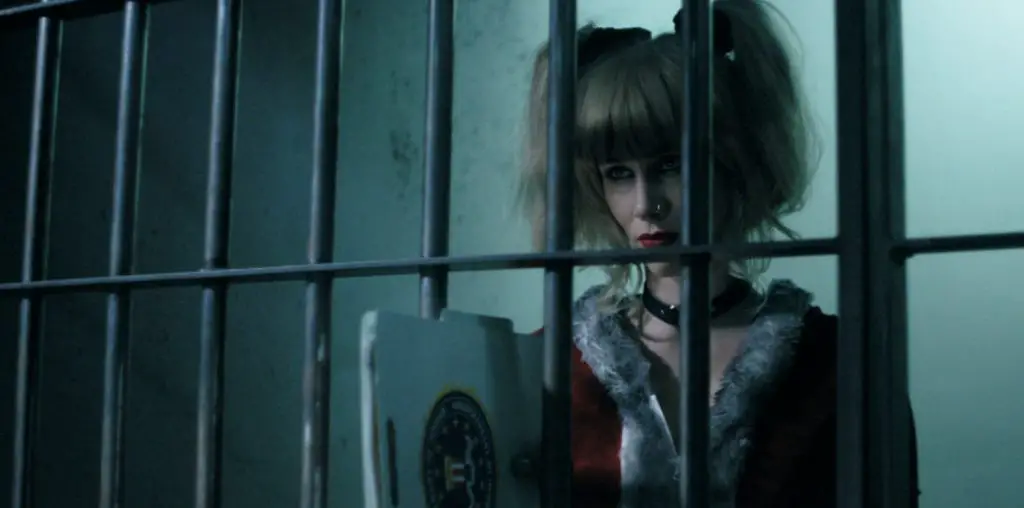
Yes, it looks great. So how hard is it to direct two people playing the same part? How does it feel generally to do it?
It was sort of fun on set because on Tuesday the trumpet player would show up and on Wednesday, Johnny Deadeyes would show up. It was fun to see who was coming on what day. For me, as the director, it was quite easy because of Stephen McHattie who prepares like a motherf***er. He’s got everything from the hair to the shoes to what’s in his pockets. He thinks through not only the physical mannerisms of the character and the pattern of the voice, but the details of the costuming, and props and where he lives. Because Stephen was involved in the scripting process, we involved him in drafts, we would show him. We had a lot of time to ponder and think about who these people were. When it came to production, that’s when things really heat up and go, Stephen’s a detail man. It was really fun to see him do it. So for my part, it wasn’t difficult at all. For his, it was intense preparation, but he’s Stephen McHattie so there was never any worry on my part. One thing that Tony (Burgess, the writer) said is it’s very important for these two guys, the trumpet player or the Maestro and Johnny looked the same. We’re not going to disguise it. It should be clear to the audience that they’re sort of the same guy. It’s also important that no one mentions it, that no one talks and says “hey, they kind of look the same”. Those were Tony’s rules about those two people. Because he wanted, kind of like the vampire, he wanted mystery. He didn’t want to explain. He resisted explaining why. Why is there a vampire? Why do these two guys look the same? Are they brothers? He said, “No, no, can’t have any that.” So great, okay. Those are the rules that we stayed by.
I think that was effective because if you guys were trying to create a mystery. I wanted to talk about Juliette Lewis and Henry Rollins because I’m big fans of them. I know you worked with Juliette Lewis before on Picture Claire, but how did you get them both to be involved, and what was it like working with them?
Well, because like you said, we had a past, Juliette and I. We love working together, it’s really fun so that was my first thought when I was thinking of The Countess. I was lucky. She could do it. Henry, I also knew. I had worked with Henry in Vancouver on this weird science-fiction t.v. show where he was this scientist. He was great. It was called Welcome to Betaville…I don’t know if that was the final title, but it was this hour-long sci-fi show and he was the main guy and we had a great time. This was years ago, so when it came to this I wondered if Henry was available because Henry would be great for this. I put out a message and within f***ing 45 seconds he came back with “YES! Yes, I’ll do it! I love Bruce!” He remembered working on that show together and having a great time. Because then he was just getting into acting, he had done a couple of things but he’s done a lot more since then.
He was telling me about some other sets he’d been on and characters he’d played. He really enjoys acting and loves to do it when he can, when he’s asked. So, it felt like a bit of a reunion for myself and Juliette and for Henry so it was a real treat. For them to come all the way to Europe. I think they liked the exoticness of flying around and coming to a place to shoot a movie. We were just lucky to have them. It’s fun working with your posse or your crew or your band. I’m remembering both of them…they’d come in and I’d be shooting and they’d just arrived and they’d wanted to come to the set to say hi. It was kind of thrilling to feel that kind of loyalty, feel that history that you have and you’ve seen all the other stuff they’ve done. It’s just great. Steve (McHattie) is like that too. He’s like family because we’ve done so many things together, and Tony, we’re always working on scripts and doing things. When you get to work with your people, you know that they deliver, you know that they’re great at what they do and that they’re lovely people, they’re good people. They treat the crew well. They’re great artists and people on the crew are dazzled. Like “Oh my God! Rollins is here!” All these Europeans and they’re like “will you let me talk to Henry?” or “Introduce me to Henry” and I say “yeah yeah sure” and of course he’s very generous, telling stories. It’s a kick when you say “Here’s my famous friend, Henry” to this guy on the crew and it made his f***ing decade.
You’ve had a lot of experience working with music, you have films about music and the music in Dreamland is wonderful and I just wanted to talk about who the actual trumpet player was and how involved were you with the music in the film?
A guy named Jonathan Goldsmith, who’s a Toronto composer, he was introduced to me by a mutual friend and the funny thing is—I’m sure you’ve heard this many times before—but when you’re editing away you’ve got what’s called a temp track, which is music that you get from records to make it feel like a movie, to show your producers that you’ve got something for music, right? So, we had all kinds of great music, and then what happened was the producers got really attached to the great music and I thought “well, great, but it’s just ideas and we can’t license this stuff.” This is a Bowie track from The Hunger or something, we can’t, even if we wanted to get it, we couldn’t. So the composer came in. It’s so amazing because the composer, what they do is unify the film, they make it all feel like one thing. Jonathan talked a little at the beginning about different things, like making it jazzy and then I would come in every couple days and he’d play me something. I’d go “Wow, that’s great, Jonathan.” He’s just a really talented guy.
The song that was written that Stephen, the trumpet player plays at the end of the film, is a Eurythmics song. In the script, Tony had written it to be an Alice Cooper song, either off Love It To Death or Killer, and we tried it but it just didn’t sound that great Chet Baker-ized. Stephen found a Eurythmics track and goes “What do you think of this?” I listened to it, it’s called “I Saved the World Today”. I was like, “Wow, those are weirdly great lyrics for this scene” and then he did his own version of it because the original recording is completely different. He did it and I thought I could see Chet Baker doing that so that’s how that song came to be. Jonathan found the trumpet player, Michael White, a great musician from Toronto, and Stephen was coached through with Jonathan to do this vocal performance. We did a number of different takes. We finally got a performance Stephen liked. He was a bit nervous doing that. He wanted to do it right so it took us a number of times to get it in the pocket as they say. He wanted to deliver that performance but also in a Chet Baker way and he’s not necessarily a trained singer so I think he did a really great job.
Thanks for talking to me because I’m a big fan of your work and as a big fan of your work I’m curious to know which directors influenced you as you were getting started as a director.
Well, I could name some that were big influences. I would say, George Romero, Night of the Living Dead is a big influence. Stanley Kubrick, of course. A guy named Nicholas Roeg, a British director who did Performance and Don’t Look Now and Bad Timing. Love him. Werner Herzog, the German director. Jean-Luc Godard, f***ing love those guys. Who else? Woody Allen, Polanski, Norman Jewison. Lately, I’d say Sofia Coppola. This Scottish director, Andrea Arnold who did a film called Red Road, I don’t know if you’ve seen that. She’s brilliant. I’m probably forgetting a whole bunch of people that I’d kick myself…Michael Winterbottom, 24 Hour Party People is such an amazing film. Cameron Crowe, he’s a great writer/director. Cassavettes.
You hit some of the good ones there, but thanks for taking the time to talk to me. I really enjoyed the movie a lot and I can’t wait for other people to see it.
Dreamland is available On Demand and Digital June 5, 2020.

